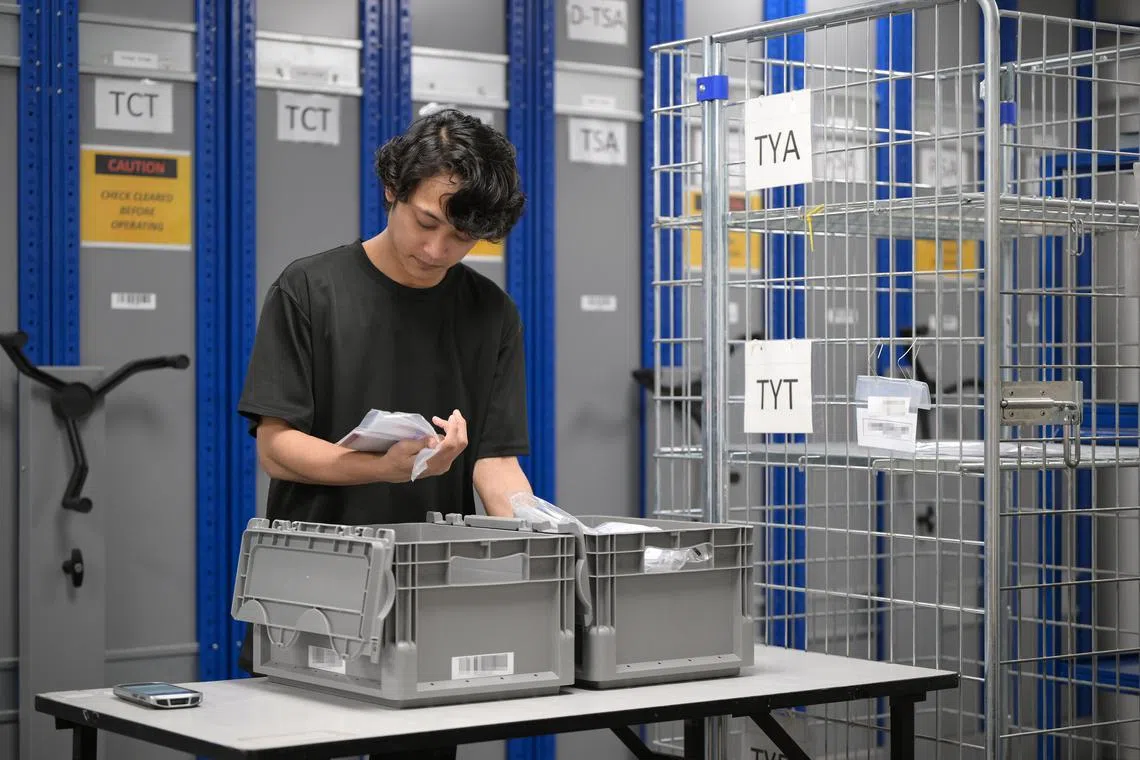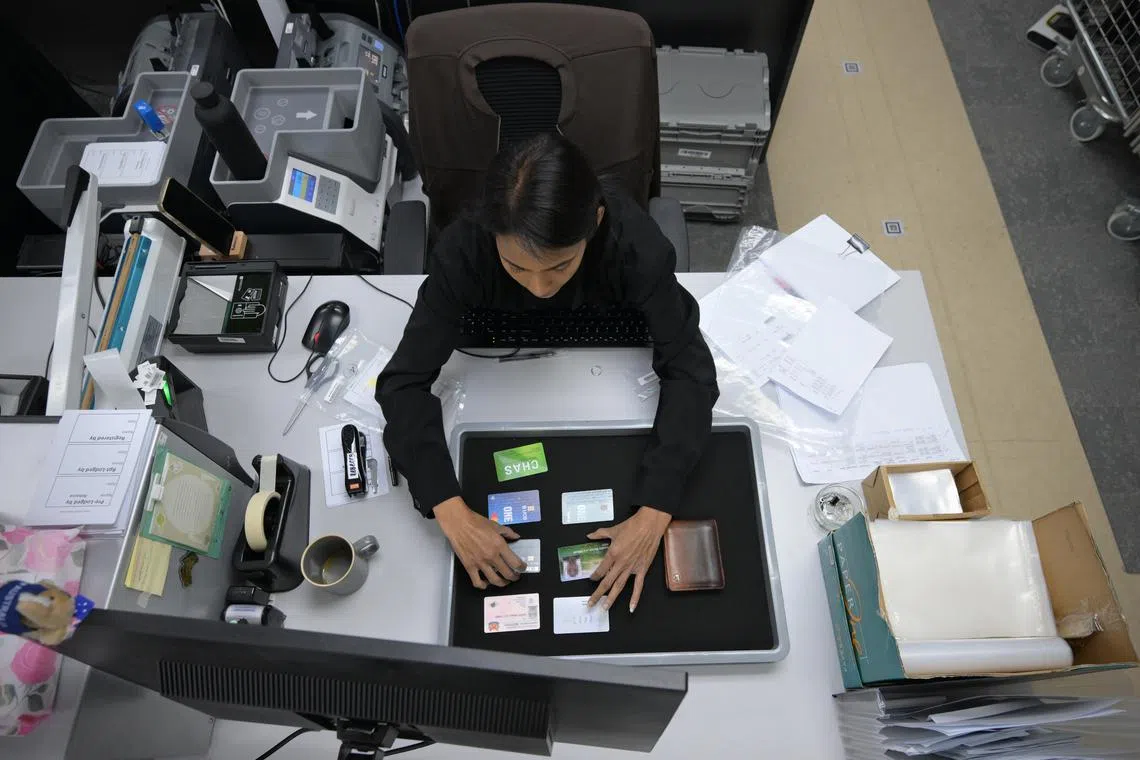More reports of found property made to police; over half traced to owners
Sign up now: Get ST's newsletters delivered to your inbox

Whether the owners of found property are located or not, the found items are kept inside hard plastic boxes in a restricted-access room.
ST PHOTO: NG SOR LUAN
Follow topic:
SINGAPORE – You could say there are more kind-hearted Singaporeans now or that more people are simply forgetting where they leave their valuables.
The fact is, more reports of found property were made to the police by the public in the past two years, compared with 2022.
About 50,000 such reports were made each year in 2023 and 2024. In 2022 alone, the number of reports of found property was roughly 42,000, said the police at the Found and Unclaimed Property Office (Fupo), a department responsible for processing surrendered items and valuables.
More than 50 per cent of those found items were successfully traced to their owners, added the police on Feb 20, when they gave the media a behind-the-scenes look at Fupo’s operations on its premises at the Police Logistics Base in Hemmant Road, near Guillemard Road.
Some found items remain unclaimed. For example, in cases involving ATM bank cards, their owners would have cancelled the lost cards and made new ones. They would usually tell the police to destroy the found cards.
When Fupo was established in 2009, processing found items and locating their owners was tedious and time-consuming, as staff had to piece together clues from the items and identifying documents and match them against a database of lost reports.
Today, fewer Fupo staff, including the department’s contracted vendors, are needed for the task.
In 2021, Fupo upgraded its operational area, doubling its capacity to manage and process found property while enhancing its productivity.
Deputy Superintendent of Police (DSP) Mohd Hussaini Abdullah, the officer in charge of Fupo, said the department is leveraging technology like artificial intelligence and robotic process automation (RPA) to carry out repetitive digital tasks and streamline back-end processes in handling found property.
DSP Hussaini said: “This not only improves accountability and governance but also helps ensure that found items are returned to their rightful owners more efficiently.”

No one is allowed to open a box containing found items except for the Found and Unclaimed Property Office staff member who is authorised to do so.
ST PHOTO: NG SOR LUAN
Bulkier found items like microwave ovens and TVs are typically taken to neighbourhood police centres (NPCs) by members of the public, while smaller ones weighing less than 1.5kg can be handed over to automated Found Property Drop Boxes located at neighbourhood police posts (NPPs).
Each day, Fupo drivers collect the found property, secured in locked boxes or tamper-proof polymer bags, from the 56 NPPs and 32 NPCs islandwide. The items are monitored through CCTV cameras inside the Global Positioning System-tracked collection vans.
Deposit Room

Found property first goes to Fupo’s Deposit Room.
ST PHOTO: NG SOR LUAN
At the department’s Deposit Room, the found items are first sorted by a Fupo staff member who is authorised to unlock the boxes.
The department receives a range of found items, from valuables such as branded luxury watches, jewellery, credit cards, wallets, cash and mobile phones, to items of less value, such as shoes and socks.
AI-powered optical camera

Above the Fupo staff member is an AI-powered optical camera which can scan, identify and distinguish between different types of found property.
ST PHOTO: NG SOR LUAN
The items are then placed in plastic boxes that go to another room called “Pre-lodging”, which is nearly twice the size of a five-room Housing Board living room.
Smart mobile robots deliver each box to the desk of a Fupo staff member, who examines the items and lays them out for scanning by an overhead AI-powered optical camera.
Manual data entry is minimised as the camera is able to read even serial numbers and names embossed on credit cards before entering the details into Fupo’s inventory management system.
Robotic process automation

After the found items are processed in the Pre-lodging room, they are moved by conveyor robots to another room where Fupo staff fill in found property reports with the help of robotic process automation.
ST PHOTO: NG SOR LUAN
In another room, staff fill in found property reports, completing each report in a matter of minutes with the help of RPA, which extracts information from Fupo’s inventory system and enters it into the report filing system. The automation has reduced report filing time by an estimated 60 per cent to 70 per cent, said the police.
Fupo staff verify that the information in the found property report is correct.
With the report registered, automated back-end screening begins.
In this process, unique identifying numbers, such as serial numbers or codes on mobile phones, passports or laptops, are matched against information in other police databases.
When a match is found, Fupo will contact the rightful owner through an e-mail, SMS or letter. Claiming found property can be done only at Fupo.

A Fupo staff member laying out items for scanning by an overhead AI-powered optical camera, which can also identify and distinguish between different types of found property.
ST PHOTO: NG SOR LUAN
The police said remembering serial numbers or unique identifying marks, such as scratches or stickers, is crucial in verifying ownership of found items.
Under the law, all found property is kept in Fupo’s restricted-access storage room for 30 days from the time it is surrendered to the police.
After that, unclaimed valuables, such as jewellery or luxury bags, are auctioned off, while cash is forfeited to the state. Non-valuable unclaimed items are incinerated.
Zaihan Mohamed Yusof is senior crime correspondent at The Straits Times.


